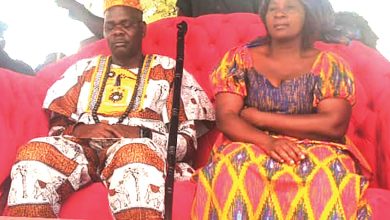Neglect dampens gold diggers love story
To many Malawians getting dirty in gold mining sites, the donkey work is a matter of life or death–a promising war on unyielding poverty, a cry for a share of the precious stones hijacked by the rich getting richer.
However, Ruth and Hastings Khongoza say theirs is a tale of love marked with hits and misses in the dumps of Chitimbe Stream in Traditional Authority Phalula along the boundary between Balaka and Neno districts.
“When people in love work together for their shared goals, they cannot die poor. Nothing can separate people who spend time together, sharing ideas and working as one for better, for worse,” says the father of two, aged 35.
Every morning, the couple wakes up at 5am and heads for the sandy stream to pan gold till sunset. The digging and shovelling have left the river pitted, shallow and prone to flooding as its course becomes blurred every day.
Like many gold diggers, the two are worried that their children and grandchildren may not find any “worthwhile” gold, forests, farmland and rivers when they grow up.
Nevertheless, they dig out tonnes of soil from the riverbed and the riverbank, often going home with one to three ponto (milligrammes) or less.

| James Chavula
“We are partners in the fight against poverty, so we’ve no time to lose,” says Hastings.
To his wife, the stream, where many dig over a tonne of soil to get a grain of gold or none, is their farm. Rather, it helps them rent fertile fields beyond the rocky hills and buy farm inputs as well as grain when hunger bites.
“We’ve mouths to feed. We don’t want our children to starve or inherit poverty, as we did. So help us God,” she says.
The push for better livelihoods jolts them to hit a footpath paved with thorny bushes and itchy buffalo beans to sift silt all day-long in a basin at a time.
“It is backbreaking. It takes time, patience, sweat and blisters, but it can be rewarding if you hit gold,” says the man, digging and shovelling soil to a riverbank lined with hairy doormats.
From the wet rag, the soaked soil flows downslope as gold sediments stick to the rags.
Some miners use mercury, which pollutes water and endangers lives, to avoid the tedious chore of soaking the soil a bucketful at a time.
However, the Khongozas have acquired a water pump to avert frequent trips to drying wells.
The pensive gold diggers carefully wash blackish sediments from the mats into a basinful of water until only the glittering silt sinks to the bottom.
It’s a life and death process, a struggle to claim a share of the heavy minerals hijacked by migrant merchants, including influential politicians, pastors, businesspersons and foreign barons.
“We call it kuzamba or kuona nkhope,” Hastings says, gazing in an orange basin. “We pay attention to detail like mzamba, a traditional birth attendant, figuring out if a newborn baby is a boy or girl”.
By contrast, kuona nkhope is the stuff of profound sorrow and closure when paying last respects to a deceased loved one.
“Fetching gold can kill your inner strength if you labour in vain. But looking at the remains, brings some tears of joy or sorrow,” he says.

gold. | James Chavula
He smiled broadly after sighting some yellowish chips in the basin.
“We get at least a gramme every week, and rarely go empty-handed,” he bragged. “If you work hard, God cannot disgrace you before your wife.”
The Reserve Bank of Malawi (RBM) offers about K260 000 per gramme at Liwonde Town, the nearest authorised gold-selling point.
Some sell theirs to covert merchants, mostly foreigners’ agents on the prowl in mining sites and neighbouring markets.
According to policy analyst Mavuto Bamusi, the gold from the country’s illegal mining is mostly smuggled to Mozambique.
RBM reports that its Export Development Fund has acquired 536 kilogrammes worth K129 billion since 2021 to boost gold and foreign currency reserves.
But every grain could be the difference between poverty and survival for farmers dazzled by the allure of gold.
“We use the earnings to pay people who do piecework in our fields and buy grain as crops keep failing due to erratic rains, barren soils and costly seed and fertiliser,” says Ruth.
Many gold diggers survive hand-to-mouth amid falling harvests due to climate change, barren soils, shrinking farmlands and environmental degradation. The heartbreaks are worsening as mining authorities and environmental protectors regulate the runaway extractive sector from far, operating from the capital city, Lilongwe, instead of deploying district mining officers, especially in mineral-rich zones.
The lovey-dovey couple in Chitimbe Stream saves part of the proceeds for dry days and coveted assets. They have moved from a grass-thatched hut to a brick house with corrugated iron sheets and now own about 10 goats.
They plan to buy a motorcycle and a taxi to carry commuters on a rocky road off the M1 to their remote locality, where only posh off-road vehicles belonging to illicit gold buyers, go-betweens and mining authorities from Capital Hill go.
Their confessed admirers include Misheck Garaja and Josephine Eleson, who were seen panning gold a stone’s throw away. Their eyes commuted between the Khongozas and a potful of beans boiling on a smoky three-stone fireplace.
“To earn more, we need all hands at work. Working as a couple also increases your luck,” joked Elson, carrying water from a murky well to a slope where her husband was panning gold.
Some bring children along, a neglected form of child labour group village head Chitimbe claims to have banned in his drought-prone village.
Pits and soil mounds increasingly dent farmlands, forests, rivers and riverbanks.
This is a well-known crisis that hides in plain sight even for Malawi Environmental Protection Authority (Mepa).
Says Mepa chief Wilfred Kadewa: “Indeed, unregulated mining poses high threats to the environment as they accelerate land degradation. Oftentimes, the pits dug by artisanal miners remain not refilled, leaving the land more vulnerable to erosion, collapse as they weaken the natural protections of slopes and streambanks, with the next heavy rains in the area triggering catastrophic slope failures, mudslides and washouts.”
The environmental protectors say they collaborate “very well” with the Mining Mines Regulatory Authority (MMRA) to ensure mining revenue—whose injection to the gross domestic product is projected to surge from one percent to 12 percent by 2027–does not come at the expense of the environment.
In a written response, MMRA director general Samuel Sakhuta, who last week was replaced by Mphatso Chikoti l, said: “The authority acknowledges that there is widespread illegal mining devastating farmers and communities around the country as well as deteriorating the rights of local people to enjoy a clean and healthy environment.”





